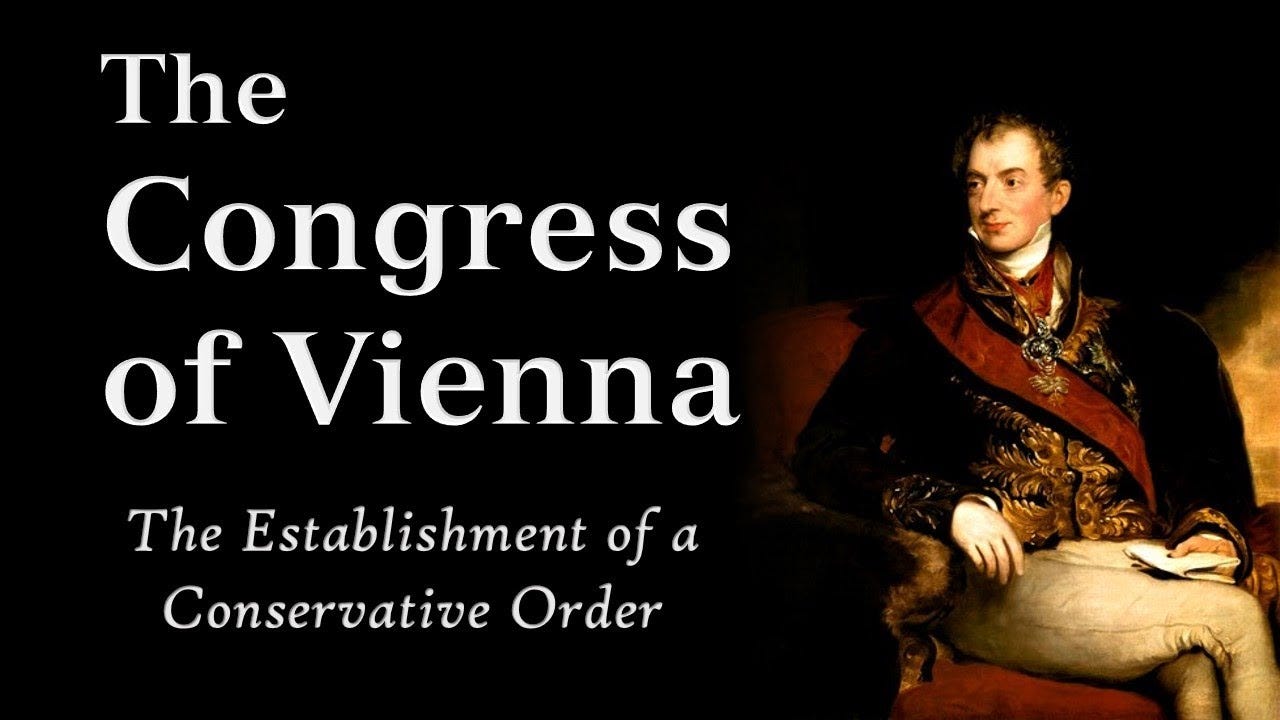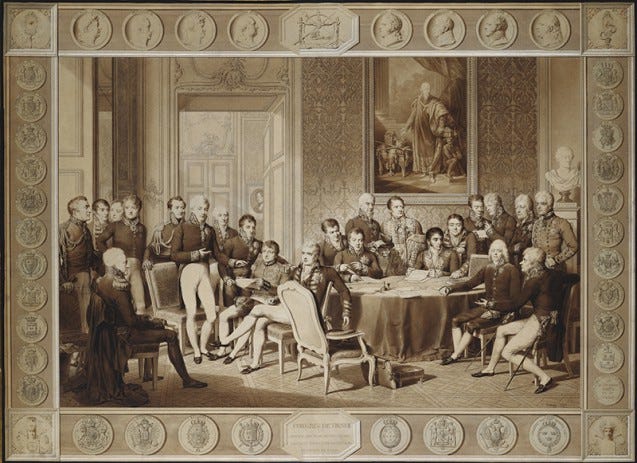The Congress of Vienna: Shaping the Future of Diplomacy in 1814
Europe Defined New Geographic and Economic Changes
Introduction
The Congress of Vienna (CoV) was held from September 1814 to June 1815. It was a diplomatic gathering to restore European order and stability after the Napoleonic Wars. The winners of the Napoleonic Wars called for the Conference, which brought together the major powers of Europe to negotiate and reshape the continent's political landscape. These changes included shifting geographical boundaries and moving economically rich areas from France to Germany (Prussia).
The Congress of Vienna was not simply the name of a post-War conference. The CoV was a significant attempt to balance the power of European countries against one another to stave off future wars. It was also not a single conference meeting. It was a set of various meetings to hammer out the post-Napoleonic negotiations for land and industry.
Why It Was Called and Who Attended
The Congress of Vienna was convened in the aftermath of Napoleon Bonaparte's defeat and abdication in 1814. The primary objective was to create a lasting peace by addressing the territorial and political upheavals caused by more than two decades of revolutionary and Napoleonic conflicts. In 1810, Napoleon had subjugated or allied with nearly all of Europe.
The leaders sought to restore the balance of power after Napoleon and prevent the resurgence of a single dominant state that could threaten European stability.
The victors of the Napoleonic Wars were the “Sixth Coalition”, which consisted of Austria, Prussia, Russia, Spain, Portugal, the United Kingdom, Sweden, and other smaller German states. Once this group defeated Napoleon and drove him into exile, different members of the Sixth Coalition called for various talks at the Council of Vienna.
The Congress was a departure from traditional peace conferences in that it was a face-to-face meeting. Most previous negotiations involved the trading of diplomatic notes between capitals. This was one of the earliest meetings of representatives from different countries meeting in a single location.
The key figures at the Congress of Vienna included representatives from the major powers of the time: Austria, France, Great Britain, Prussia, and Russia
Representatives from many other European states participated in the congress, and in addition to these major powers, they contributed to the complex negotiations and agreements that shaped the continent's future.
The “Congress of Vienna” implies that it was a single conference, but it was not. Many nations and interests were in attendance, and much of the deal-making occurred in Vienna's coffee shops and public facilities.
Outcomes and Changes to Europe
The Congress of Vienna produced a series of treaties and agreements that redefined Europe's political boundaries and governance. Some of the most significant outcomes included:
· Restoration of Monarchies: The congress sought to restore the pre-Napoleonic monarchies that had been overthrown or weakened. The Bourbon dynasty was reinstated in France, and other Monarchies were returned to power in Spain, Portugal, the Netherlands, the Papal States (back to the Pope), and various kingdoms and duchies in present-day Italy.
· Redrawing of Borders: The territorial map of Europe was significantly altered. The Austrian Empire gained control of northern Italy and parts of Eastern Europe, while Prussia expanded its territory in the Rhineland and Saxony. The German Confederation was established, replacing the fragmented Holy Roman Empire. These expansions included areas of industry which were transferred from France.
· Creation of a Balance of Power: The Congress implemented a system of checks and balances to prevent any single nation from dominating Europe. The United Kingdom, Austria, Prussia, and Russia formed a Quadruple Alliance to maintain the new European order and suppress revolutionary movements.
· Establishment of Neutral States: Switzerland was recognized as a neutral state, serving as a buffer between France and its neighbors. Belgium's neutrality was also established, which was united with the Netherlands to form the Kingdom of the United Netherlands.
· Suppression of the Slave Trade: The congress addressed the issue of the transatlantic slave trade, with several powers agreeing to work towards its abolition. However, slow progress marked the beginning of international efforts to end the practice.
· Montenegro: The Congress also established the country of Montenegro. This is a relatively minor point, but I love Montenegro, so I am including it.
Impacts of the Congress
The Congress of Vienna has had a lasting impact on European and global politics. Some of the enduring effects and influences include:
· Principle of Diplomacy: The congress established a precedent for resolving international disputes through diplomacy and negotiation rather than warfare. This principle laid the groundwork for future diplomatic congresses and international organizations, such as the League of Nations and the United Nations.
· Concept of a Balance of Power: Maintaining a balance of power among nations to prevent the dominance of one state remains a cornerstone of international relations. This concept has influenced the formation of alliances and the conduct of foreign policy to this day. Previous to the CoV, most alliances were transactional and short-lived. The CoV started the progression towards defensive alliances to secure peace.
· National Sovereignty: The Congress helped to solidify the notion of national sovereignty and the legitimacy of established governments. This principle has continued to shape the modern international system, emphasizing the importance of respecting national borders and governance.
Legacy of Concert of Europe:
The Concert of Europe, an informal cooperation system among the great powers, emerged from the congress. It aimed to maintain stability and peace in Europe through regular consultations and collective action. While the concert eventually dissolved, it influenced the development of multilateral diplomacy and collective security arrangements.
This concept of defensive alliances pulled together NATO to stem the influence of the USSR. Other defensive alliances like SEATO became obsolete due to the members’ conflicting aspirations.
The Congress of Vienna was a pivotal event that reshaped Europe and established principles that continue to influence international relations. Its legacy is evident in the enduring emphasis on diplomacy, balance of power, and national sovereignty in the modern world.





